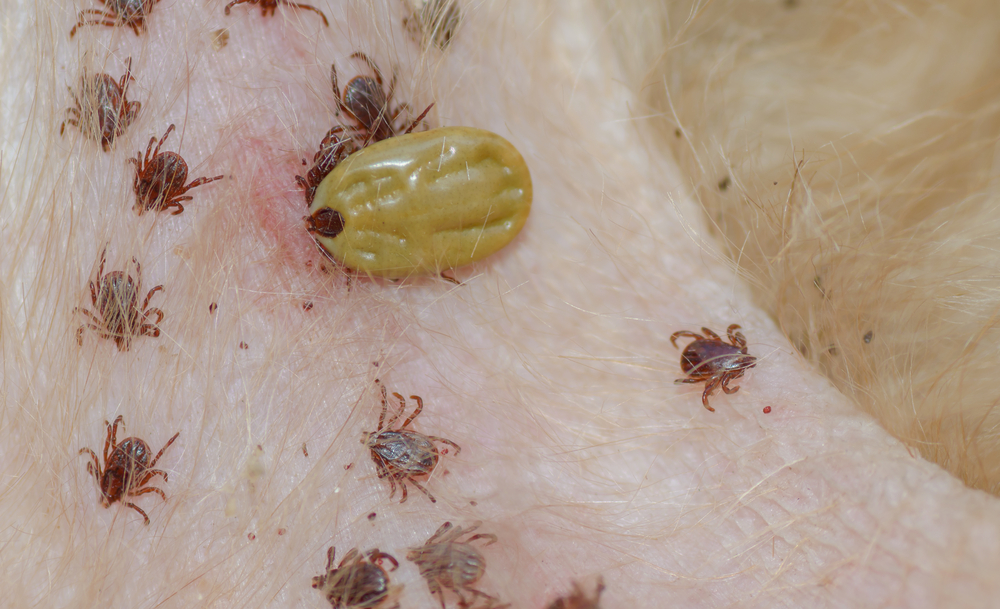Here in Florida, you can’t seem to avoid the various biting, stinging, and bloodsucking pests that swarm you as soon as you step outdoors. While your pet’s thick fur coat may provide them with some protection from biting bugs, they are still susceptible to a parasitic invasion. To protect your four-legged friend from assorted insects, follow our Advanced Veterinary Care of Pasco team’s tips on flea and tick prevention.
#1: Learn about the flea life cycle and how they infest your pet
The flea life cycle is incredibly complex for such a tiny pest. Understanding each life stage and its vulnerabilities is important for protecting your pet from a flea infestation, and for eradicating one if it happens.
Although adult fleas make up only 5% of the total fleas in your environment, they have no qualms about jumping aboard your pet to have a hot meal. While on your furry pal, fleas reproduce and deposit eggs that fall off your pet into your environment, especially your carpeting and furniture. Eggs hatch best in warm and humid environments, so Florida’s weather is ideal for flea reproduction. After the eggs hatch into larvae, they spin cocoons as quickly as five days after hatching. Once the pupae are inside their protective cocoon, they can survive for months or years before emerging as adults.
#2: Understand how to eliminate fleas from your pet and your environment
Not all flea life stages are susceptible to insecticides, which makes a flea infestation extremely difficult to eradicate. To eliminate fleas from your home and pet, follow these tips:
- Treat everyone — Administer flea prevention to every household pet, no matter whether they go outside.
- Vacuum everywhere — Vacuum each home area that your pet frequents, focusing on carpeting, along baseboards, and under furniture.
- Launder everything — To kill fleas, launder all your pet’s bedding and toys in hot water.
You may also use a pet-safe insecticide to treat your home. Use a product that has a residual effect to ensure it kills the susceptible flea life stages as they mature.
#3: Know how to safely remove a tick from your pet
If a tick climbs aboard your pet and latches on, you need to know how to remove the pest safely and completely. First, verify that the bump on your furry pal’s skin is indeed an eight-legged tick. Ticks can range in size from no bigger than a poppy seed, up to the size of a pencil eraser.
After verifying that you truly found a tick, use a pair of fine-tipped tweezers to grasp the tick’s head firmly, as close as possible to your pet’s skin. Pull straight back using steady, even pressure. Avoid twisting or jerking the tick. Once you have completed this procedure, double-check to ensure you removed the tick’s mouthparts. Cleanse the bite wound with an antiseptic rinse and monitor the area.
#4: Avoid walking your pet in tick territory
Contrary to popular belief, ticks do not fall from trees. However, ticks are more likely to live in heavily wooded areas that have dense vegetation. When ticks are searching for a meal, they climb to the top of tall grasses or weeds, and, standing with their legs outstretched, grab onto a suitable host as they walk by. Avoid tick hotbeds by walking in the middle of well-manicured paths, staying away from a field’s tree line, and keeping out of dense brush.
#5: Landscape your yard to protect your pet from parasites
Because ticks prefer thick vegetation and tall weeds, maintain a well-trimmed lawn. If your property is adjacent to a forested area, consider adding a rock or mulch border between your grassy yard and the woods. To discourage wildlife from making a home in your yard, remove leaf litter and debris, as doing so will reduce tick host populations.
#6: Discuss flea and tick prevention options with your veterinarian
Flea and tick prevention isn’t one size fits all. Each pet has their own unique needs for protection against parasites, and certain pre-existing health conditions or concerns may preclude them from particular preventives.
Our Advanced Veterinary Care of Pasco team will discuss the best preventive type for your pet’s lifestyle. For example, if your dog swims frequently, an oral preventive would be an ideal choice. If your cat fights you tooth and nail each month when you try to give them their oral flea prevention, a topical application would be best.
#7: Set up a prevention-administration reminder with your veterinarian

Florida doesn’t have much of a winter, especially frigid temperatures that kill parasites. Our mild Hudson winter weather makes administering year-round parasite prevention to your pet extremely important, because fleas, ticks, mosquitoes, and intestinal parasites are always active. If you forget to give your pet their parasite preventive on time, your four-legged friend will be vulnerable to parasitic infection. Set up automatic reminders to ensure you give your furry pal their parasite preventive on schedule, year-round.
If you’re unsure which parasite preventive best suits your pet’s lifestyle, discuss the options with our Advanced Veterinary Care of Pasco team.








Leave A Comment